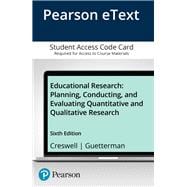Educational Research offers a truly balanced, inclusive, and integrated overview of the processes involved in educational research. This text first examines the general steps in the research process and then details the procedures for conducting specific types of quantitative, qualitative, and mixed methods studies. Direct guidance on reading research is included, and features provide opportunities for practice.
Pearson eText is an easy-to-use digital textbook that instructors can assign for their course. The mobile app lets you keep on learning, no matter where your day takes you — even when you're offline. You can also add highlights, bookmarks, and notes in your Pearson eText to study how you like.
NOTE: You are purchasing an access card only. Pearson eText is a fully digital delivery of Pearson content. Before purchasing, check with your instructor to confirm the correct ISBN. To register for and use Pearson eText, you may also need a course invite link, which your instructor will provide. Follow the instructions provided on the access card to learn more.











